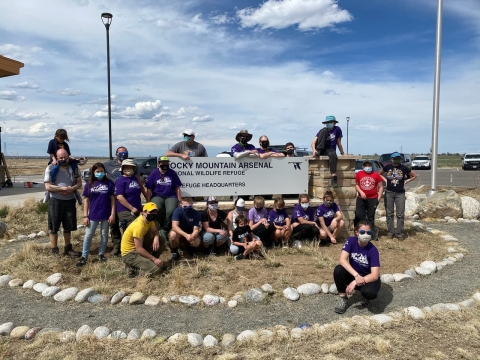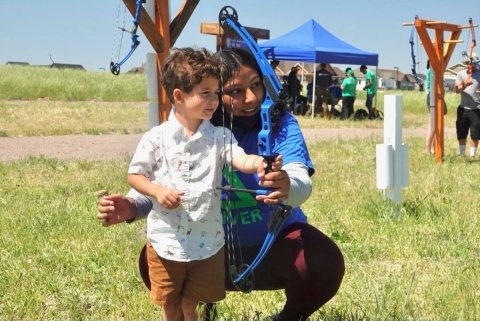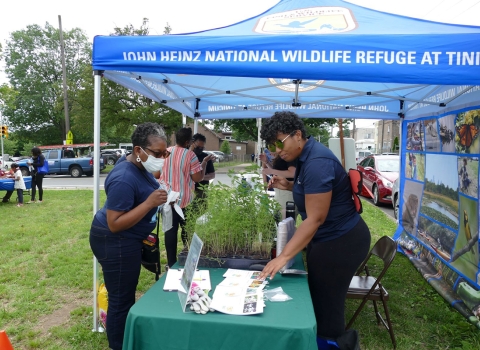We know that 80% of Americans live or work near cities and that many of these urban communities represent underserved populations. The work of our Urban Wildlife Conservation Program may not always be called Environmental Justice. From our standpoint, it’s about being an asset to the community, inspiring the next generation of outdoor enthusiasts, and ensuring long-term conservation.
Environmental Justice is about spreading environmental disadvantages equitably among all people. It is also about helping all people to share the benefits of conservation. And it’s about making sure everyone is part of discussions about environmental issues that affect them.
That’s where our Urban Wildlife Conservation Program comes in.
We work to understand individual conservation issues as they affect the interests of local communities. Then we try to address these needs to help fish, wildlife, and people.
We have set up such programs across the country, including one in Denver, Colorado.
On National Get Outdoors Day, June 12, Missouri Basin and Upper Colorado Basin Regional Director Noreen Walsh announced that Denver’s Rocky Mountain Arsenal National Wildlife Refuge will be awarded $1 million in additional annual funding to expand their Urban Wildlife Conservation Program. With this funding as a flagship urban refuge, Rocky Mountain Arsenal will be able to better support local communities in the Denver area by offering a safe outdoor place for the community and visitors to enjoy recreation in their nearby nature.
The refuge will also be able to improve infrastructure, provide more environmental education opportunities, and support community partnerships.
“We are thrilled to be able to invest additional resources in providing opportunities for diverse local communities to use and enjoy the refuge,”
Walsh says. “Our vision is for the Rocky Mountain Arsenal National Wildlife Refuge to be a place where all are welcome and where visitors can enjoy access to the natural world and learn about our native wildlife. We are especially excited to be able to invest these new resources in connecting to and partnering with our neighbors in this urban metropolitan area.”
Established as a national wildlife refuge national wildlife refuge
A national wildlife refuge is typically a contiguous area of land and water managed by the U.S. Fish and Wildlife Service for the conservation and, where appropriate, restoration of fish, wildlife and plant resources and their habitats for the benefit of present and future generations of Americans.
Learn more about national wildlife refuge in 1992, the prairie and lakes of Rocky Mountain Arsenal attract raptors, migrating songbirds, wintering ducks, and geese. The refuge also provides habitat for a variety of mammals including bison, coyote, deer, and one of North America’s most endangered mammals, the black-footed ferret.
What makes this public land truly unique is its location in the Denver metro area.
At 15,000 acres, Rocky Mountain Arsenal National Wildlife Refuge is one of the largest urban refuges in the country.
It is a place where wildlife thrives, and people can reconnect with nature. Visitor amenities include more than 20 miles of hiking trails, an 11-mile wildlife drive, seasonal fishing, a visitor center, and much more.
Over the last eight years, Rocky Mountain Arsenal and the two other refuges in the Denver metro area, Two Ponds and Rocky Flats National Wildlife Refuges, have become leading destinations for Denver’s fast growing diverse urban population. Latinx and African-American residents make up 75% of the communities surrounding the refuge. The Service has been engaging with the local community to understand their vision for the refuge. Visitor Services Manager Sarah Metzer says, “Conservation success stems from our understanding of the communities we serve, and we are committed to listening, growing, and continually improving from community feedback.”
During this first year of increased funding, the staff will invest in infrastructure projects that improve accessibility and connect refuge lands to local communities through pedestrian pathways with nature play areas at those entrances. The Service plans to build additional capacity through staffing, focusing on recruiting Spanish-speaking interpreters to help better connect with the Spanish-speaking community. The refuge will also expand youth hiring programs to offer opportunities for local youth to connect to conservation.
Biden-Harris administration priorities of equitable conservation, diversity and inclusion, climate resilience, and building back better are all supported by this opportunity at Rocky Mountain Arsenal.
- This article is from the summer issue of Fish & Wildlife News, our quarterly magazine.
- More Fish and Wildlife News, including how to subscribe to our Fish and Wildlife News email list.










